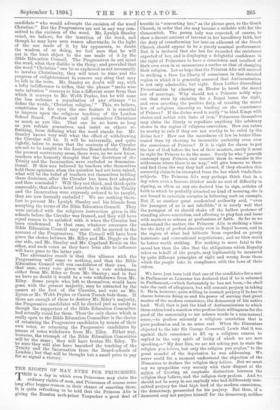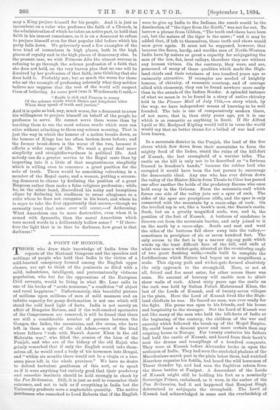THE RIGHTS OF MAN EVEN FOR PRINCESSES. T HIS is a
day in which even Princesses may claim the THE RIGHTS OF MAN EVEN FOR PRINCESSES. THIS is a day in which even Princesses may claim the ordinary rights of man, and Princesses of course come long after beggar-women in their chance of asserting them. It is quite refreshing to be told that the Princess Alix is giving the Russian arch-priest Yanysohev a good deal of trouble in "converting her," as the phrase goes, to the Greek Church, in order that she may become a suitable wife for the Cesarewitoh. The young lady was expected, of course, to show a decent amount of interest in her hereditary faith, lest the duty of transforming her into an adherent of the Greek Church should appear to be a purely nominal performance. But it is declared that she has far exceeded the resistance expected of her, and is displaying a delightful confidence in the right of Princesses to have a conscience and intellect of their own even in so momentous a matter as that of changing their religion. Let us hope that the Princess Alix will succeed in striking a blow for liberty of conscience in that elevated region in which it is generally assumed that Antinomianism is not only admissible, bat right. Even Luther discredited Protestantism by allowing an Elector to break the moral law of marriage. Why should not a Princess nobly wipe out that stain by claiming for a Royal house the right, and even asserting the positive duty, of treating the moral law of religious sincerity as binding on the consciences of Princes ? If the divine word is really " to bind Kings with chains and nobles with links of iron," Princesses themselves may claim the liberty to repudiate anything like arbitrary choice in the region of religious conviction. How can rulers be worthy to rule if they are not worthy to be ruled by the divine law ? How can the sacredness of law be better illus- trated than by showing its inexorable authority even over the conscience of Princes ? If it is right for slaves to put the law of God before the law of their masters, surely it must be right for Princes to do the same. Surely he who " poureth contempt upon Princes, and causeth them to wander in the wilderness where there is no way," will give honour to them and find them the way they had missed, if they abandon this unworthy claim to be exempted from the law which binds their subjects. The Princess Alix may perhaps think that in a day when even a famous thinker made no sort of difficulty in signing, as often as any one desired him to sign, articles of faith to which he probably attached no kind of meaning, she is not bound to entertain scruples in following such an example. But if, as another great academical authority said, " even the youngest of us is not infallible," it is surely well that the youngest of us should shake off the hollow pretence of standing above conviction, and affecting to play fast and loose with matters so solemn as professions of faith. So far as we understand the matter, the Princess Alia is striking a blow for the duty of perfect sincerity even in Royal houses, and in the region of what had hitherto been regarded as purely histrionic and conventional negotiations ; and no blow could be better worth striking. For nothing is more fatal to the moral law than the idea that the obligations which Royalty takes on behalf of the people, may legitimately be measured by quite different principles of right and wrong from those which the people take in compliance with the laws of their rulers.
We have just been told that one of the candidates for a seat in Parliament at Leicester has declared that if he is returned to Parliament,—which fortunately he has not been,—he shall take the oath of allegiance, but will commit perjury in taking it. He is, however, quite willing to commit perjury if he has to choose between doing so and his power of serving that great master of the modern conscience, the democracy of his native land. Well, that is just the kind of Antinomianism to which those rulers lend a sanction who profess their willingness for the good of the community to use solemn words in a non-natural sense,—to profess solemnly a religious conviction that is pure profession and in no sense real. When the Dissenters objected to the late Sir George Cornewall Lewis that it was against their conscience to fill up a religious census, he replied in the very spirit of laxity of which we are now speaking,—" My dear Sirs, we are not asking you to state the religion you believe, but only the religion you profess," to the great scandal of the deputation he was addressing. We never could for a moment understand the objection of the Dissenters to declare the religion they believe. But we must say we sympathise very warmly with their disgust at the netion of drawing an emphatic distinction between the religion they believe, and the religion they profess. And wo should not be sorry to see anybody who had deliberately com- mitted perjury for that high lord of the modern conscience, the democracy, prosecuted for his perjury. But then, if a democrat may not perjure himself for the democracy, neither may a King perjure himself for his people. And it is just as incumbent on a ruler who professes the faith of a Church, in the administration of which he takes an active part, to hold that faith in his inmost conscience, as it is on a democrat to refuse to perjure himself even for that popular idol before which his party falls down. We grievously need a few examples of the true kind of iconoclasm in high places, both in the high places of royalty and in the high places of democracy also. In the present case, we wish Princess Alix the utmost success in refusing to go through the solemn profession of a faith that she does not hold, on the very barren plea that no one will be deceived by her profession of that faith, into thinking that she does hold it. Probably not; but so much the worse for those who set the example of professing solemnly what they neither believe nor suppose that the rest of the world will suspect them of believing. As some poet (was it Wordsworth P) said,— " Earth is sick and Heaven is weary Of the solemn words which States and kingdoms utter When they speak of truth and justice."
And it is quite as bad, nay, much worse, for a democrat to avow his willingness to perjure himself on behalf of the people he professes to serve. He cannot serve them worse than by teaching them to use the most solemn words which man can utter without attaching to them any solemn meaning. That is just the way in which the honour of a nation breaks down, as the honour of Kings has too often broken down before; and the former break-down is the worse of the two, because it affects a wider range of life. We want a great deal more simplicity and straightforwardness in political life. And nobody can do a greater service to the Royal caste than by importing into it a little of that magnanimous simplicity which is willing even to renounce a great position for the sake of truth. There would be something refreshing in a member of the Royal caste, and a woman, putting a scream- ing democrat to shame by declining the position of a great Empress rather than make a false religious profession; while he, on the other hand, discredited his noisy and bumptious clique by declaring his readiness to swear allegiance to a ruler whom he does not recognise in his heart, and whom he is eager to take the first opportunity that occurs,—though we earnestly trust that none ever will ocour,—of dethroning. What Anarchism can be more destructive, even when it is armed with dynamite, than the moral Anarchism which uses sacred words in a deliberately hollow sense P " If there- fore the light that is in thee be darkness, how great is that darkness I "



































 Previous page
Previous page